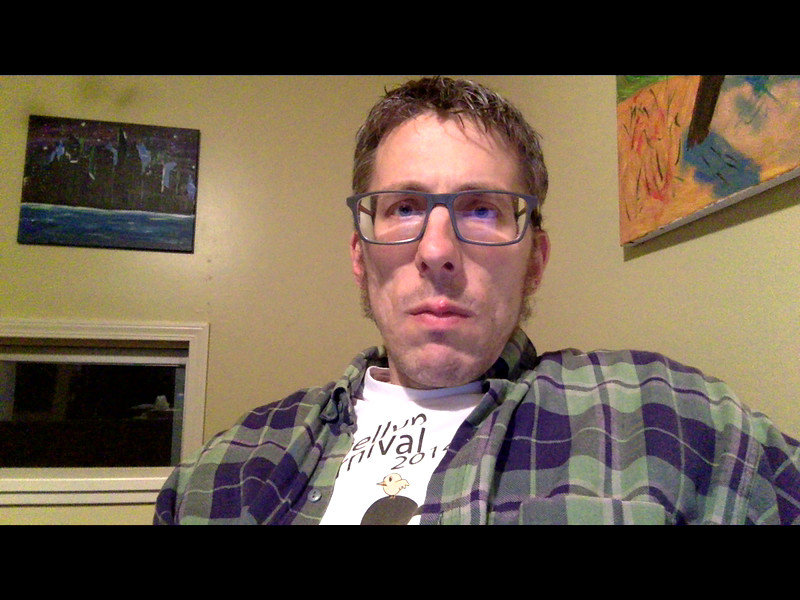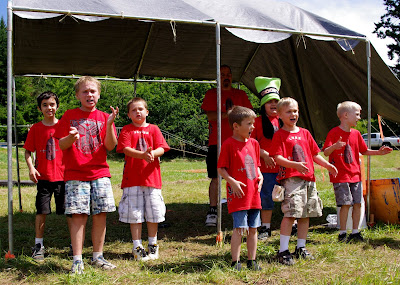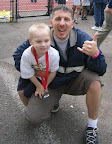Sometimes a Great Notion
We were supposed to have driven to Wilsonville to eat Moroccan food with friends who live in Salem. Their babysitter backed-out on them at the last minute, so Meg and I scrapped together a plan for two. I had read in the Oregonian that Sometimes a Great Notion (novel by Ken Kesey that I started reading last year but had a difficult time following it) was playing for one night only at the Hollywood Theater. We like to visit different theaters around town, especially those that have a long history. The film was made in 1970 and is mostly about Oregon logging men, so I thought Meg might quickly dismiss the idea and suggest something else. But she gave the green light of acceptance, and our backup plan was finalized.
 After eating dinner (served by an acquaintance who also has kids at Llewellyn) at a place on East Burnside, we drove to Hollywood and bought our tickets early. Meg wasn't feeling well, so she welcomed the extra time to sit and let her body overcame its ails. The 500-seat theater gradually filled up and then overflowed, with management setting up extra chairs and letting the last few entrants stand at the back in the aisles. The patrons skewed heavily towards couples in their 50's and 60's, so I of course commented how young we were compared to the crowd. Meg questioned my observations, and pointed to two or three other young-ish people in the crowd. We were still the one percent.
After eating dinner (served by an acquaintance who also has kids at Llewellyn) at a place on East Burnside, we drove to Hollywood and bought our tickets early. Meg wasn't feeling well, so she welcomed the extra time to sit and let her body overcame its ails. The 500-seat theater gradually filled up and then overflowed, with management setting up extra chairs and letting the last few entrants stand at the back in the aisles. The patrons skewed heavily towards couples in their 50's and 60's, so I of course commented how young we were compared to the crowd. Meg questioned my observations, and pointed to two or three other young-ish people in the crowd. We were still the one percent.
Having read the first few chapters of the novel, I had a vague idea what the story would be about, but I didn't know any of the specific plot points. I loved seeing the multiple generations of family living and working together, seeing how people of a different era spent their days working and how they used their time off, and witnessing how differently Oregonians logged the land and treated the environment so harshly--such a contrast to our steward-like attitudes of today. I ranked the final scene of the film as one of my favorites of all time--maybe even the best.
During the movie I heard what sounded like rain falling on the theater roof, which was odd because, as the pictures above show, it was a sunny evening when we entered the theater. About 90 minutes in the babysitter rang Meg's cell phone. The babysitter never calls, so Meg texted her back to discern the problem. Aaron was at a friend's house for a party and had become freaked out when a thunderstorm rolled in and he witnessed lightning strike. He said he cowered under a table and asked to call Meg for reassurance that all would be well. He was fine once the storm passed but was happy when we picked him up on our way home.
 After eating dinner (served by an acquaintance who also has kids at Llewellyn) at a place on East Burnside, we drove to Hollywood and bought our tickets early. Meg wasn't feeling well, so she welcomed the extra time to sit and let her body overcame its ails. The 500-seat theater gradually filled up and then overflowed, with management setting up extra chairs and letting the last few entrants stand at the back in the aisles. The patrons skewed heavily towards couples in their 50's and 60's, so I of course commented how young we were compared to the crowd. Meg questioned my observations, and pointed to two or three other young-ish people in the crowd. We were still the one percent.
After eating dinner (served by an acquaintance who also has kids at Llewellyn) at a place on East Burnside, we drove to Hollywood and bought our tickets early. Meg wasn't feeling well, so she welcomed the extra time to sit and let her body overcame its ails. The 500-seat theater gradually filled up and then overflowed, with management setting up extra chairs and letting the last few entrants stand at the back in the aisles. The patrons skewed heavily towards couples in their 50's and 60's, so I of course commented how young we were compared to the crowd. Meg questioned my observations, and pointed to two or three other young-ish people in the crowd. We were still the one percent.Having read the first few chapters of the novel, I had a vague idea what the story would be about, but I didn't know any of the specific plot points. I loved seeing the multiple generations of family living and working together, seeing how people of a different era spent their days working and how they used their time off, and witnessing how differently Oregonians logged the land and treated the environment so harshly--such a contrast to our steward-like attitudes of today. I ranked the final scene of the film as one of my favorites of all time--maybe even the best.
During the movie I heard what sounded like rain falling on the theater roof, which was odd because, as the pictures above show, it was a sunny evening when we entered the theater. About 90 minutes in the babysitter rang Meg's cell phone. The babysitter never calls, so Meg texted her back to discern the problem. Aaron was at a friend's house for a party and had become freaked out when a thunderstorm rolled in and he witnessed lightning strike. He said he cowered under a table and asked to call Meg for reassurance that all would be well. He was fine once the storm passed but was happy when we picked him up on our way home.




Comments
Post a Comment